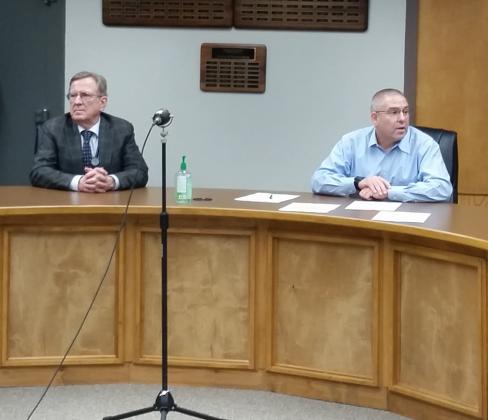Officials tell Scurry County residents to stay home
A Stay Home, Stay Safe order went into effect for Scurry County at 11:59 p.m. Friday.
The order, announced by county judge Dan Hicks during a Thursday press conference, requires Scurry County residents to shelter in place in their residences and to maintain “social distancing” of at least six feet from others. The order also orders non-essential businesses to cease all activity, except for “minimum basic operations.”
The initial order has a duration of seven days, although Hicks and Dr. Bid Cooper said it could be extended as needed.
“We’re asking in this order to keep guidelines already in place,” Hicks said. “We want you to self-regulate. Follow the CDC guidelines. Wash your hands. If you’re sick, stay home. Cover your coughs and sneezes.”
According to the order, “All individuals currently living within Scurry County, Texas, are ordered to shelter and stay at their place of residence…. All persons may leave their residences only for essential activities or for performing or accessing essential government functions, healthcare operations, essential business and essential critical infrastructure.”
“Basically this stay at home order tells you to stay at home,” Hicks said. “Don’t go out and do anything that is not essential. ‘Essential’ is going to be going to work if you work at an essential place, going to the doctor, going to the grocery store, going to pick up medication and things like that. Non-essential businesses are hair salons, nail salons and things like that. Non-essential travel — don’t travel unless you have to. Don’t go to a friend’s house down the road and play poker, or go across the street, or go around the corner, or go across town to spend time with someone, unless it’s someone that needs help. If there’s someone that you are delivering groceries to, or you’re going over to help them take care of themselves, you can do that, but don’t just go and spend time with somebody just to spend time with somebody.”
Hicks addressed the assertion that the current Coronavirus pandemic is a worse threat than modern-day influenza.
“It is as bad as the flu, it’s actually worse, I think, because we don’t have any inoculations,” Hicks said. “We don’t have anything to prevent it. They’re working on it, but it takes time. This thing came out of the blue. We weren’t expecting it. You get a flu vaccine, but there’s no vaccine for this.”
Hicks said that in-home cleaning services and maid services would be considered non-essential under the rule, because cleaners or maids have the potential to spread the virus from one home to another.
Outdoor exercise is allowed, if people maintain social distancing from others and return home following their exercise routine.
Hicks dispelled rumors of an impending 11 p.m. curfew, saying there “is no curfew at all.”
He encouraged families to send one person to the grocery store rather than take the whole family.
“Go in by yourself, get your groceries, do your social distancing in the grocery store, get what you need, get in and get out,” he said.
Judge Hicks said leisure driving will be considered non-essential travel, but that local parks will remain open.
“The park is still open,” he said. “I would say don’t climb on the equipment and don’t have the kids climb on the equipment because we’re not going to be out there cleaning after everybody that goes there.”
Hicks said there is a penalty for not following the order.
“There is a penalty in there,” Hicks said. “On the second-to-last page of the order, you can get a $1,000 fine or up to 180 days in jail. We’re not looking to put people in jail. We’re looking for compliance on this.”
The order lists businesses considered essential and those considered non-essential.
Essential businesses include, but are not limited to, sources of food, such as grocery stores, food banks, convenience stores, etc.; healthcare operations such as hospitals and doctors’ offices; essential government functions; food cultivation, such as farms, livestock production and garden centers; residential, transportation and commercial construction; businesses that provide food, shelter and social services to the economically disadvantaged; news media; gas stations and fuel suppliers; automotive related businesses, such as auto supply stores, auto repair and maintenance businesses and auto sales; banks and related financial institutions; hardware stores; trash collection, processing and disposal services; facilities cleaning, maintenance and security operations; warehouse distribution and fulfillment; storage operations for essential businesses; funeral-related services, such as funeral homes, crematoriums and cemeteries; services essential to safety and sanitation of buildings, such as plumbers, electricians, exterminators, etc.; mailing and shipping services; educational institutions via distance learning; laundry services such as laundromats and dry cleaners; restaurants for delivery or carry-out only; professional services such as legal or accounting services; childcare services, given that the providers comply with a list of mandatory conditions keeping children and caregivers in groups of no more than 10; retail clothing stores; package stores and tobacco stores via curbside or drive-thru services only; energy production and energy equipment businesses; and wedding venues and services, while a wedding is being conducted only.
Non-essential businesses include hair salons, nail salons, tanning salons including spray tanning, barber shops, tattoo parlors, piercing businesses, hair removal waxing businesses, massage businesses, commercial amusement and entertainment businesses including arcades, game rooms, indoor movie theaters, bars and lounges, gyms and fitness facilities.
Meetings of service clubs such as Lions Club, Kiwanis, Rotary, etc., are also prohibited.
Non-essential businesses can perform “minimum basic operations,” Hicks said.
“What that means is, you’re closed to the public, but you can go in and do the work you need to do, or you can work from home,” he said. “It’s the minimum basic activities necessary to maintain the business. Payroll, inventory, security, etc.”
The full order may be viewed online by clicking on the yellow Stay Safe, Stay Home button on the newspaper’s website.


